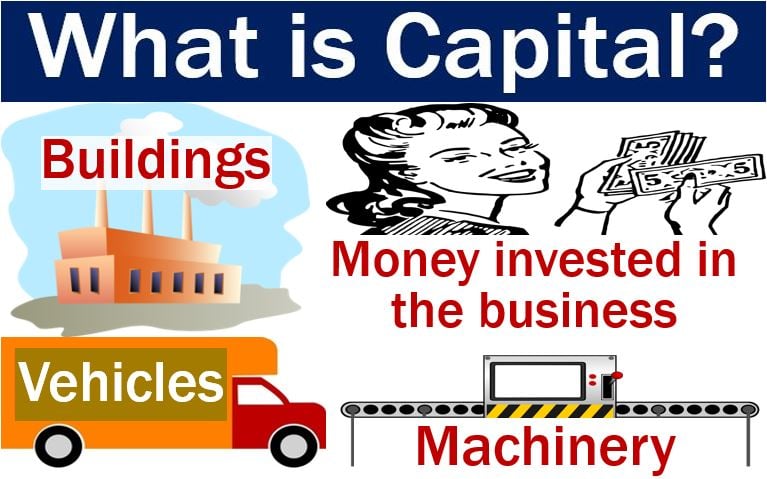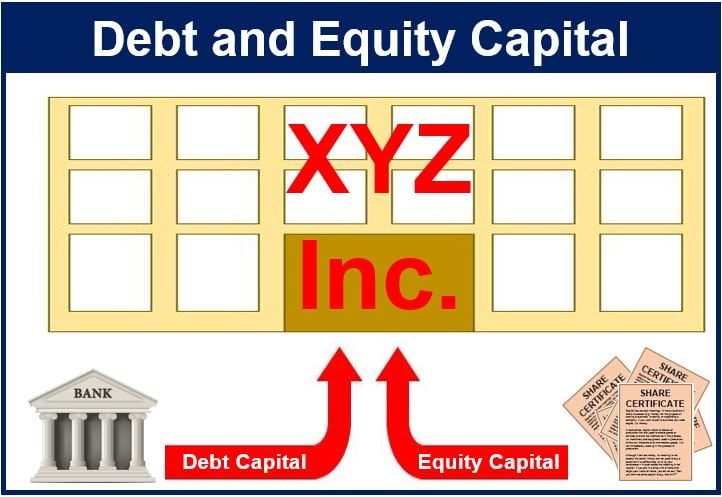Capital – definition and meaning
The term Capital has several meanings. It may refer to money to set up a business, invest, or expand a company. If you want to start a business, you need money. In economics, capital refers to factors of production that we use to create goods or services, such as machinery, tools, buildings, and technology. These assets enhance our ability to produce and increase output.
However, these factors aren’t directly consumed during production. Fixed capital, for example, includes money we spend on machinery and equipment that we use in production. Unlike raw materials and intermediate goods, we do not use up machinery in the process of production.
Although the term may refer to money, its meaning is not the same. We can use money to buy a sandwich in a coffee shop or to tip our hairdresser. We do not use ‘capital’ to tip somebody or buy a sandwich.
The term comes from ‘capitale’, a late Latin word based on ‘Caput’, which meant ‘head.’
Capital – generation of wealth
Capital refers to things that generate wealth through investment. In other words, it only means money when we use it to create wealth. For example, if I use money to expand a factory, I am generating wealth. However, if I use money to buy chocolate I am not creating wealth.
Capital includes money, vehicles, equipment, machinery, brand names, and patents. In other words, anything that creates wealth.

Apart from using it to produce things, we can also rent it out for a fee to create wealth.
However, we first need to produce it. It does not exist until we produce it. To create wealth, we must combine it with the work of employees. These workers exchange their time and know-how for money.
If you invest in money by abstaining from consumption, you can enjoy prosperity later on. In this context, consumption refers to consuming/purchasing goods and services.
Adam Smith (1723-1790), a Scottish philosopher and pioneer of political economy, said:
“That part of a man’s stock which he expects to afford him revenue is called his capital.”
Some economists, like Henry George (1839-1897), believed that financial instruments were not ‘capital’. Examples of financial instruments are mortgages, stocks, bonds, etc.
Mr. George said, “their increase or decrease does not affect the sum of wealth in the community.” In other words, they do not create wealth.

Human capital
This term refers to qualities that the people in a country have. Above all, qualities that can generate and increase national wealth. This includes education, skills, knowledge, and experience.
Japan and Germany recovered rapidly after WWII because of their populations’ high levels of education, skills, knowledge, and experience. Additionally, the two countries have hard-working people.
Working Capital
This term refers to the money a business needs for its day-to-day trading operations.
We calculate it as current assets minus current liabilities. A company has a working capital deficit if current liabilities are greater than current assets.
According to Oxford Dictionaries, capital is:
“Wealth in the form of money or other assets owned by a person or organization or available for a purpose such as starting a company or investing,” or “A valuable resource of a particular kind.”
The term may refer to the city that functions as the seat of government and administrative center of a country region or state. In spelling, the term ‘capitals’ refers to upper-case letters.
Capital flows
This term refers to the international movement of money. However, it only includes money for investment purposes. For example, money going from one country into another country’s stock market is a capital flow.
It does not include money we use to pay for imported goods.

